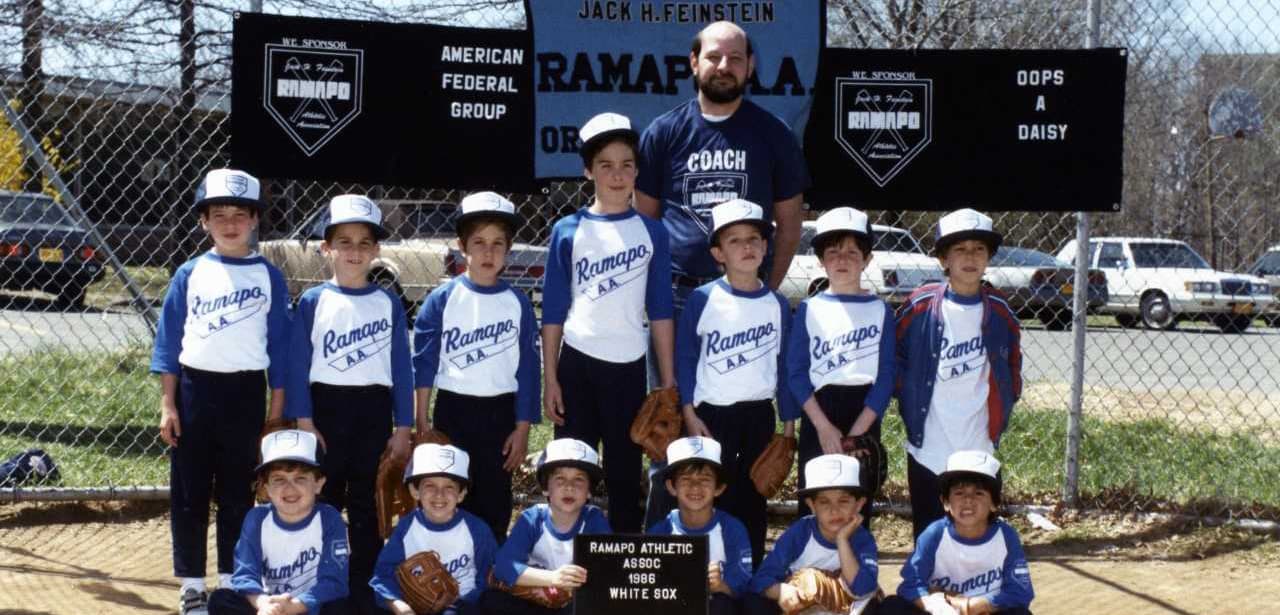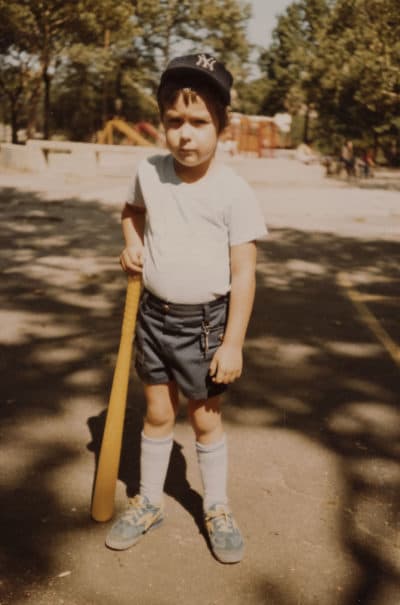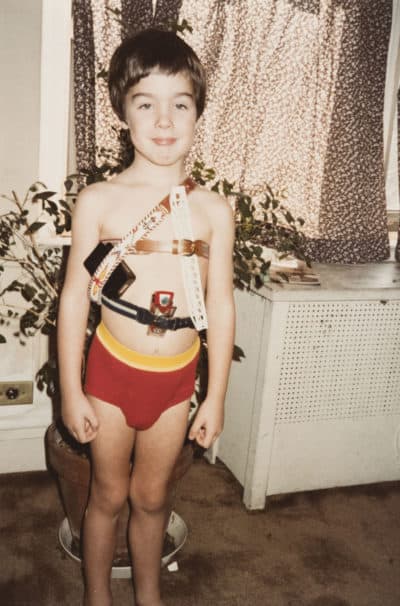Advertisement
He Started Puberty When He Was 2 Years Old. Now, He's Sharing His Experience

Editor's Note: This segment was rebroadcast on Nov. 28, 2019. That audio is available here.
One thing all humans have in common is that at a certain point in our childhood, we go through puberty: we get bigger, our bodies change, we often get a little rambunctious and moody, and we mature sexually.
But imagine if those changes occurred not when you were 11 or 13 or 15 years old, but when you were a toddler. That was the experience of Patrick Burleigh, who has a rare genetic mutation that triggers testosterone production far younger than normal.
Doctors call it precocious puberty.
"It's extremely rare — it's estimated that there might be like fewer than 1,000 of us," says Burleigh, who wrote about his experience in New York magazine. "And basically it's a mutation of the luteinizing hormone chorionic gonadotropin receptor gene, which is responsible for triggering testosterone production in the testicles."
Burleigh tells Here & Now's Jeremy Hobson his family was anticipating his symptoms of early puberty because his father, grandfather and great-grandfather all went through it, too. One of the earliest was Burleigh getting his first pubic hair when he was just 2 years old.
"I was bigger — considerably bigger — than a 2-year-old, and also [had] impulsive behavior that's characteristic of someone going through puberty," he says. "Like just, you know, an inability to control my impulses, aggressive outbursts, hitting other kids, tantrums that were kind of truly epic — just behavior that was extreme."
Advertisement
Interview Highlights
On being twice the size of other kids growing up
"I was huge. ... I was treated for the mutation at the National Institutes of Health in Maryland, and my first visit, I was about 3 years old and I weighed as much and was as tall as a 7-year-old, and had the testosterone levels of a 14-year-old — kind of deep in the throes of puberty. So I was huge and I was not just bigger, but also, I had all this testosterone coursing through my body, so I was muscular, and when I was 3 and 4 years old I was kind of, basically until I was about 7, sort of an athletic phenom. I was hitting home runs and ... everyone wanted me on their team because I was just much bigger and stronger."

On how aware he was of what was going on
"I knew I was different, obviously, and I knew that ... I was taking a lot of medication to suppress the production of testosterone. So I knew that there was something sort of wrong with me biologically. But beyond that, I didn't know much. And I also ... I have no memory of a time before all of this, you know? So there was no moment when it kind of changed for me physically, which is normally what happens when you're, you know, a conscious 13-year-old and your body starts to change."
On whether he grew up feeling like there was something wrong with him
"Yeah, yes. Because it was so behavioral, and because I was ... beginning at about 4 and 5, I started to get in trouble in school a lot, because I just wasn't able to control my impulses, and I looked so dramatically different from everyone else that sort of normal misbehavior was amplified, in my case. If there were a group of us and we were all doing something wrong on the playground, I stuck out and would kind of take the blame. And so, sort of being bad and looking different and feeling different was all sort of packaged up together.
"I started to lie about my age when I was probably about 8. It was easy to do this, because I looked so much older and it was also, in a way, it was easier for me to not have to explain why I looked so much older. ... So I would just tell people ... when I was 8, I would tell them I was 12 or 13, and so I started to hang out with older kids and kids who were doing things that were kind of beyond my peers, and that meant sexual stuff, and it also meant smoking cigarettes and experimenting with substances — kind of all the other rebellious behavior that's normally associated with teenagers I started to do when I was considerably younger."
"I would just tell people ... when I was 8, I would tell them I was 12 or 13, and so I started to hang out with older kids and kids who were doing things that were kind of beyond my peers."
Patrick Burleigh
On his peers eventually catching up with him, and whether symptoms last beyond puberty
"About 14 or 15, everyone else caught up and I also finished, and kind of the convergence of those two really ... it was almost overnight. All of a sudden I kind of looked around and I no longer stuck out. I was no longer this outcast. And also just hormonally, I was all of a sudden kind of more subdued.

"The one kind of lingering [symptom] is that men who have this, they don't grow to their full stature, what they call target height. Most men who have had familial male-limited precocious puberty end up only being around 5 feet tall. I ended up being 6 feet tall, and I think that's a combination of the medication that I took in all my treatment, as well as just having tall genes — like my brother's 6'6" and he didn't inherit a mutation. So I think I was lucky in that way. But other than that, no, it's purely developmental — once puberty is done with you, it's done. It goes away."
On growing out of precocious puberty, and how going through it shaped him as a teenager and beyond
"I still kind of feel different, honestly, even though if you met me, you wouldn't think of me as different. But I think, those feelings of being other and not fitting in, as well as sort of being labeled 'bad,' from an early age, they stayed with me, even though by the time I was 15 or 16, I had sort of made a 180-degree turn in my life. I was no longer getting in trouble and I did well in school, and I was a decent athlete. I think that I did, once I began to fit in, I did feel relief, and at the same time a desire to — not unlike my father — kind of hide my past and hide the challenges, and what I felt for a long time was kind of a deviant past."
On his great-grandfather, who because of the mutation was able to lie about his age and become the youngest American to serve in World War I
"He ran away from home at age 10, and, kind of taken with patriotic fervor, he joined. He was shipped off to war and was, like, fighting in the trenches, fighting on the front lines by the time he was 11 and 12 years old. They didn't discover his his real age. He told them that he was 20 years old, and he looked convincingly 20 years old at the time.
"He got drunk with some fellow soldiers and they took a cargo plane up — they essentially hijacked it and were kind of joy riding. And when it was grounded, he got in trouble, and as punishment they sent him once more to the front, and he suffered mustard gas poisoning and was hospitalized, and only then did the U.S. government discover that he was actually only 13 at the time, and they sent him home. He had a momentary flash of celebrity when the newspapers caught wind of the story and they dubbed him 'the youngest Yank.' "
"Selecting out for that mutation, eliminating it from my lineage, in a way it felt like eliminating this essential part of myself. And that was a feeling that ... surprised me. But it was present."
Patrick Burleigh, on confronting the potential for his own child to go through precocious puberty
On his thought process when he and his wife were thinking about having kids of their own
"I didn't know, when we were going through the process of thinking about having a child, I didn't know that it would be possible to test for this. It didn't occur to me. My wife and I ended up doing in vitro fertilization, and we ended up with fertilized embryos, and my wife happens to be an endocrinologist, and so we found out that we could test the embryos for the LHCGR mutation. And so ... I was faced suddenly with this decision, whether or not to select out for this mutation.
"It feels like an obvious decision, right? Like, why would I ever wish the challenges that I endured on my own child? But it ended up being a lot more complex than that, because this mutation — for all of those struggles — it ... has defined me. Certainly it defined my childhood, and had a profound and lasting kind of impact on how I think about myself and probably the path that I've taken. The same is true for my father and my grandfather and great-grandfather. And so selecting out for that mutation, eliminating it from my lineage, in a way it felt like eliminating this essential part of myself. And that was a feeling that ... surprised me. But it was present."
On whether Burleigh's father encouraged him to select out for the precocious puberty mutation or not
"He didn't, he didn't, which kind of shocked me, because having precocious puberty had been so traumatic for him that it's not even something that he really wants to talk about with me. So I was surprised that he encouraged me not to do it. I mean he would have supported me either way, but I think that he felt the same way that I did, which is that it was very hard. But it's sort of that cliché, like, 'what doesn't kill you makes you stronger.'
"It led to this conversation which I write about in the article, one of the first and only kind of conversations that we've ever had about our shared experiences having precocious puberty, in which he said to me, 'Your son, if he inherits this disease, with you as his father he'll be fine, and I have confidence in you as a parent.' My wife and I, we talked about it a lot, and sort of investigated all of our options and in the end we felt like we were capable of dealing with it, and also that the treatment had sort of progressed far enough that our son, were he to inherit it, would be all right.
"It was definitely ... it was moving to hear that from my father. Especially because I still — and I think, if I can speak for him, he does as well — I still carry around this feeling of being a mutant, in a way, like there's something wrong with me. So those words are meaningful."
On whether the genetic mutation was passed on to his two children
"We rolled the dice with our son, and luckily he didn't inherit the mutation. And our daughter, who's 1 1/2, we haven't tested her, because the mutation doesn't manifest in women because you have to have testicles. So we'll either get her tested later, or she'll test herself before she has her own children."
On when he thinks he'll tell his son about his experience
"That's a good question. I don't know. I think maybe in a few years, he'll be 4 soon. It's a pretty complex concept, but you know, probably in the next few years, I think."
Julia Corcoran produced this interview and edited it for broadcast with Todd Mundt. Jack Mitchell adapted it for the web.
This segment aired on January 29, 2019.
